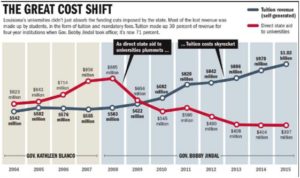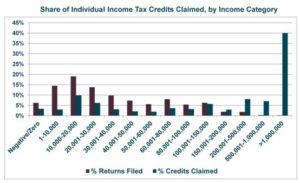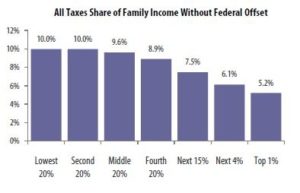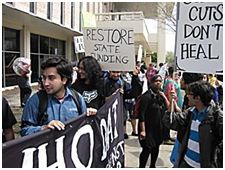By Nathalie Clarke and Dylane Borne
In spite of his 2015 campaign promises to reallocate savings to health services and education, Gov. John Bel Edwards, a Democrat who supposedly has the workers’ best interests at heart, showed himself willing to slash education before anything else: to compensate for a $1 billion deficit, he declared on January 22nd that he would cut the Louisiana state budget by $994 million. On January 31st his office announced that he had cut the budget by $672 million since being elected, cutting $11.9 million from higher education–a success in “fiscal responsibility” according to them. Since Bobby Jindal was elected governor in 2008, funding for public colleges has been cut, and tuition has persistently increased, going from 39% of universities’ revenue to 71% in 2015.
This new cut is just the continuation of capitalist politics: these cuts will disproportionately affect working families that cannot afford out-of-state or private universities, ridiculous fees at private hospitals, or private healthcare. In 2016, when Edwards threatened the Louisiana Legislature with a $131 million budget cut, SUNO declared that 50% of adjunct faculty would be released, eliminating certain course sections. In 2010 UNO faced $13 million in cutbacks. As a result, multiple programs including Women and Gender Studies and other liberal arts majors were completely eliminated.

(Source: the advocate)
The cuts will destroy TOPS, a scholarship that covers tuition for hundreds of thousands of students. Although TOPS has its own problems (it’s based on ACT scores, and because of how expensive ACT training is, rich whites almost always do better), it’s better than nothing, and the new budget cuts will probably cut it by 80%. The last shred of hope for working families to send their children to college is pretty much gone. Costs of attendance have continuously been increasing; LSU tuition and fees now total almost $30,000.

The seven-figure-income-wealthy rake in the bulk of tax credits by far. (Source: Revenue Study Commission)

Comparison of total percent taxes paid by each income bracket. The lowest 20% of workers pay almost twice as much as the very wealthiest. (Source: Institute on Taxation and Economic Policy)
We call these cuts “capitalist” because they never fail to benefit the rich and powerful at the expense of the working class. When the government of Louisiana decides to cut the budget, it never affects the military, the prison-slavery complex, or the NOPD and their fancy new surveillance cameras, because those are “mandatory spending.” Schools, mental health services, Medicaid, youth programs, and day care are all “discretionary,” or optional, spending. And while the rich contribute only 4.2% of their income in taxes to these programs, the working class pays a full 10%. So not only do workers see their programs cut, but because of the regressive tax code that steals wealth from the poor and redistributes it to the rich, we may not be able to afford private services to replace them. In 2012, a study by the Revenue Study Commission found that the top 2.3% of taxpayers raked in 55% of tax credits. These tax credits alone could refund TOPS– film industry tax credits totaled at $231 million according to the study.
In the past, students and faculty from public universities around New Orleans have fought back against the budget cuts. In 2010 and 2015 at UNO, SUNO, McNeese, and LSU alike, students and professors have rallied, chanted, and marched to defend the right to a decent education. While the government is slow to respond, the 2015 protests led to a partial renewal of TOPS funding. And international movements give us hope: only 50 years ago, in May 1968, students around Paris created a mass movement that, combined with other protests and strikes, profoundly impacted the face of French politics. The state doesn’t have our interests at heart, but it gives us what we deserve when we hold its feet to the fire. Only a powerful student movement will solve our education crisis.

Protest against budget cuts at the University of New Orleans in 2010. Cuts and tuition hikes have only gotten worse since. (Source: gambit)
